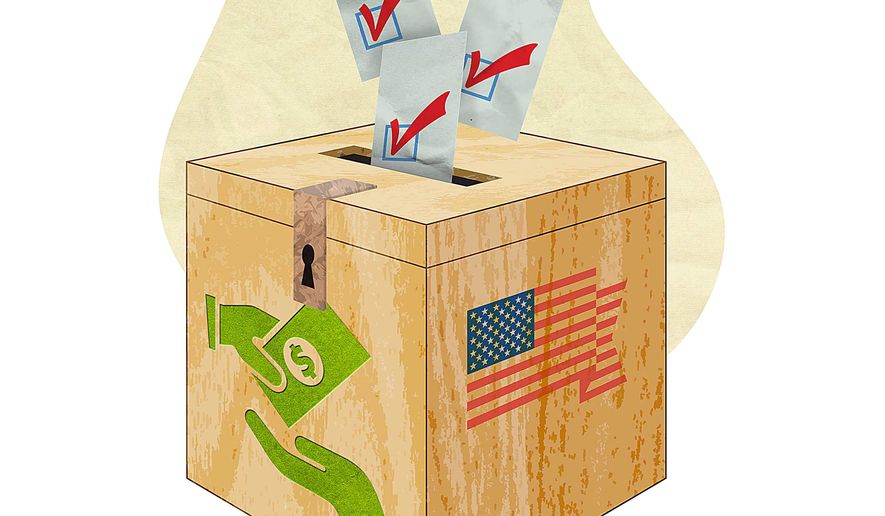OPINION:
In schools across the country, student body presidents are elected by making pie-in-the-sky promises. Guarantees of longer lunch breaks, more games at recess, free snacks at the snack bar, and less homework very often lead to a win at the polls, even if the candidate’s ability to follow through on such outlandish promises is questionable.
Today in American politics, we’re seeing a similar type of campaign with a good chance of securing a much more powerful presidential office. By promising the American public they can have everything they want at no cost, Sen. Bernie Sanders could win the White House.
From Day One, the Sanders campaign was underestimated. It was considered a fringe campaign by the establishment, a bad investment by donors, and a non-threat by other candidates. It was seen as the JV team to Hillary Clinton’s varsity operation. In reality, it may prove to be the biggest threat to Democratic and Republican candidates alike.
Why is Mr. Sanders’ campaign surprising everyone? Why is it a threat to the Clinton machine? Why does Mr. Sanders, a self-proclaimed socialist, have a chance of becoming president in 2016? And how will he accomplish such a coup? By using an extreme version of a tried-and-true play right out of the Democratic National Committee playbook — promise voters free stuff — against the presumptive Democratic nominee, with an assist from an insurgent wing of the Democratic Party.
Crippling student loans have placed a massive burden on young Americans for whom a college degree is the new high school diploma, and graduate school is a requirement in a more competitive job market. Polls continue to show student loans being a top pocketbook issue for millennial voters. Mr. Sanders is bringing back the power of the single-issue voter and mobilizing otherwise disengaged young Americans by touting a “free lunch” proposal to forgive or lessen interest on the more than $1.2 trillion in student loan debt in America, in essence buying the votes of millions of Americans with taxpayers’ money.
His free college proposal, like most of his populist ideas, is likely dead on arrival in Congress. But a desperate electorate, hungry for real change after a disappointing Obama presidency that overpromised and underdelivered, is likely to fall for his sales pitch. As the campaign progresses, we can expect a Sanders proposal to forgive student loans to complement his promise to make secondary education free for all students which, by all accounts, would be impossible to pay for without massive tax hikes or crippling cuts to other programs. In doing this, Mr. Sanders is garnering an unprecedented amount of support from students, parents of students who have shared the burden for their children’s student loans, and young families who see free college as a way to avoid one of the most expensive costs of raising a child.
This type of a proposal will be difficult for Hillary Clinton to support with her close ties to Wall Street, which would be adversely impacted by such a massive, new government expenditure. Republican candidates risk losing their conservative base if they support such a measure, and they’ll lose moderate voters if they oppose it. For Mr. Sanders, it’s a win-win.
The more interesting aspect of this impending campaign proposal is how it will be pitched to the masses — with the appearance of almost universal support at the local level in cities throughout America — through an insurgent grass-roots network run by Americans for Financial Reform (AFR). The strength of this network, much like Mr. Sanders’ campaign, has been underestimated by the Democratic establishment and ignored by political rivals.
The ACORN-like network of grass-roots activists overseen by AFR has been growing during the last 10 years. It includes hundreds of local, state and national organizations that have focused their activism on issues such as Wall Street reform, passing the Dodd-Frank Act, dismantling the short-term loan industry, advocating for postal banking, and creating new government agencies like the Consumer Financial Protection Bureau to use the power of an unregulated and unaccountable agency to impose reams of new regulations on numerous industries.
Their engagement could allow Sanders & Co. to overtake the Clinton machine with an effective and pervasive grass-roots campaign.
The Republican Party isn’t the only one facing down the barrel of all-out civil war within their ranks. Democratic National Committee Chairman Debbie Wasserman Schultz is heading toward a battle in her own party between establishment Democrats who feel it’s Hillary’s turn, and the far-left, more ideologically ambitious Warren wing.
Sen. Elizabeth Warren, like Mr. Sanders, supports socialist policies that would nationalize post-secondary education, among other free-market industries. The extensive AFR network, with their advocate in chief, Ms. Warren, is poised to prop up a Sanders candidacy over what they see as a too-moderate, milquetoast Clinton campaign. Right now, Mr. Sanders, Ms. Warren, her pet project, the Consumer Financial Protection Bureau, and AFR are beginning a coordinated campaign that will support Mr. Sanders with the far-left wing of the Democratic Party to focus on student loans.
The Clinton machine has long depended on connections with wealthy and powerful individuals. Among the Clinton coalition are well-funded, well-established organizations and a host of veteran strategists loyal to the Clinton brand. But financial backing and experienced advisers only go so far against an impassioned insurgency. The Sanders campaign are relying on AFR’s robust network of disillusioned Democrats, community organizers and passionate activists hungry for more than the incremental change proposed by Hillary Clinton.
Time will tell how great the threat these groups present to the Democratic Party establishment. But socialism sells, and with as tantalizing an offer as student loan forgiveness and free college education, it’s almost guaranteed to work.
• Brian J. Wise is the managing partner of Wise Public Affairs, LLC and president of the U.S. Consumer Coalition.




Please read our comment policy before commenting.